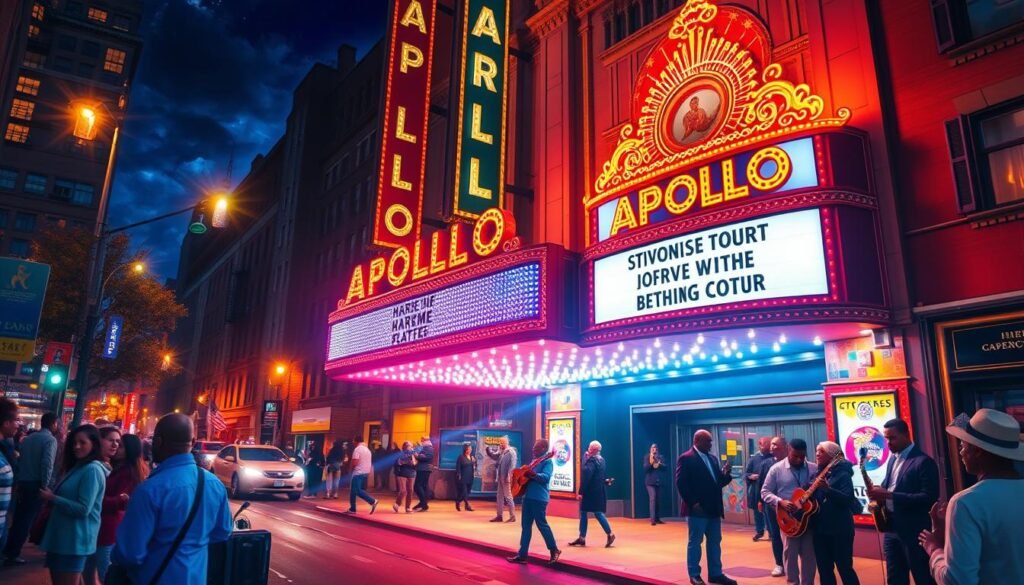
As the lights dim, the crowd quiets, and a jazz saxophone fills the air. You’re transported to another time. In Harlem, New York City, the Apollo Theater shines as a cultural beacon. It’s where jazz, swing, bebop, and blues have echoed for years, drawing in fans and shaping American music.
Walking into the Apollo, you feel history’s presence. Stars like Ella Fitzgerald, Billie Holiday, and Duke Ellington have performed here. It’s a place where Harlem’s jazz energy comes alive, leaving unforgettable marks.
In Harlem, jazz is more than a show; it’s a cultural dive. It’s a chance to connect with the area’s musical past. From cozy clubs to big stages, Harlem’s jazz calls out to you, inviting you to explore and feel its rhythm.
[Take a tour at Harlem Culture]
Key Takeaways
- Discover the legendary Apollo Theater, a beacon of African-American culture and a birthplace for musical icons.
- Immerse yourself in Harlem’s vibrant jazz scene, with a diverse array of live performances, from intimate clubs to grand stages.
- Explore the rich musical history that has defined Harlem, from the emergence of quintessentially American genres like jazz, swing, and bebop.
- Witness the captivating live music experience that makes Harlem a must-visit destination for any lover of cultural and musical exploration.
- Plan your Harlem jazz adventure, from where to stay and dine to the best venues and events to experience the city’s musical heartbeat.
The Legendary Apollo Theater of Harlem
A Beacon of African-American Culture
Since 1914, the Apollo Theater has been key in the rise of many music genres. It was built by George Keister and first opened as “Hurtig and Seamon’s New Burlesque Theater.” In 1934, it became the 125th Street Apollo Theatre, focusing on variety shows for Harlem’s growing African-American community.
Where Stars are Born and Legends are Made
From 1935 to the late 1970s, the Apollo was a top spot for live shows in Harlem. It hosted legends like Ella Fitzgerald, Sarah Vaughan, and Billie Holiday. Stars like Sammy Davis Jr., James Brown, and Gladys Knight also got their start here.
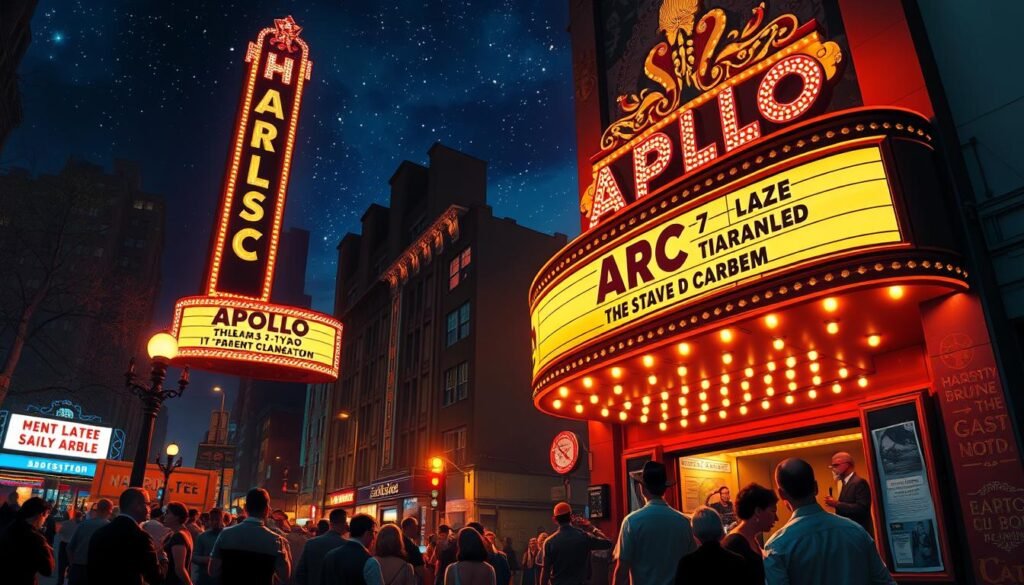
The Apollo Theater has hosted Amateur Night for 90 years. It’s where talents like Ella Fitzgerald, Luther Vandross, and Lauryn Hill were discovered. It shines a light on new Black stars, making it a symbol of African-American culture.
Immerse Yourself in the Rich Musical History
Harlem’s musical legacy is deeply rooted in American culture. The Apollo Theater, a legendary venue, has been a key player in shaping jazz, blues, soul, and hip-hop. It has seen the rise of icons like Aretha Franklin and James Brown.
From Jazz and Blues to Soul and Hip-Hop
The Apollo Theater has been a testing ground for new artists. It showcases the richness of African-American musical traditions. Visitors can experience the soulful rhythms of jazz and blues, the emotive power of soul, and the infectious energy of hip-hop all in one place.
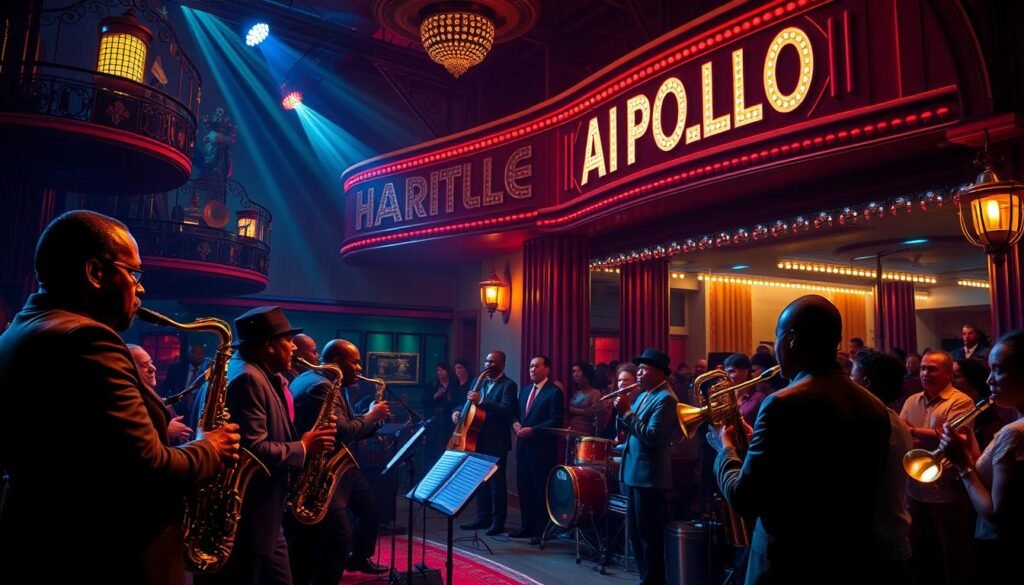
The Apollo’s impact goes beyond its walls. It played a key role in the Harlem Renaissance, influencing American art, literature, and music. A visit to the Apollo Theater is essential for anyone wanting to grasp American musical history.
Experience Live Performances at Iconic Venues
Step into Harlem’s heart and dive into the rich world of live music at the Apollo Theater. This legendary spot has been a key part of African-American culture. It has helped grow American music, from jazz and blues to soul and hip-hop.
See the excitement of Amateur Night competitions. Here, new stars try to make it big, just like Ella Fitzgerald and Pearl Bailey did. Enjoy the soulful sounds of Rhythm and Blues Revues, featuring talents like Sam and Dave and Otis Redding.
The Apollo Theater still hosts many shows today. You can see concerts, plays, and community events. It keeps the legacy of the “World’s Most Famous Arena” alive. Events like the Apollo Spring Benefit and Africa Now! festival show Harlem’s creativity and culture.
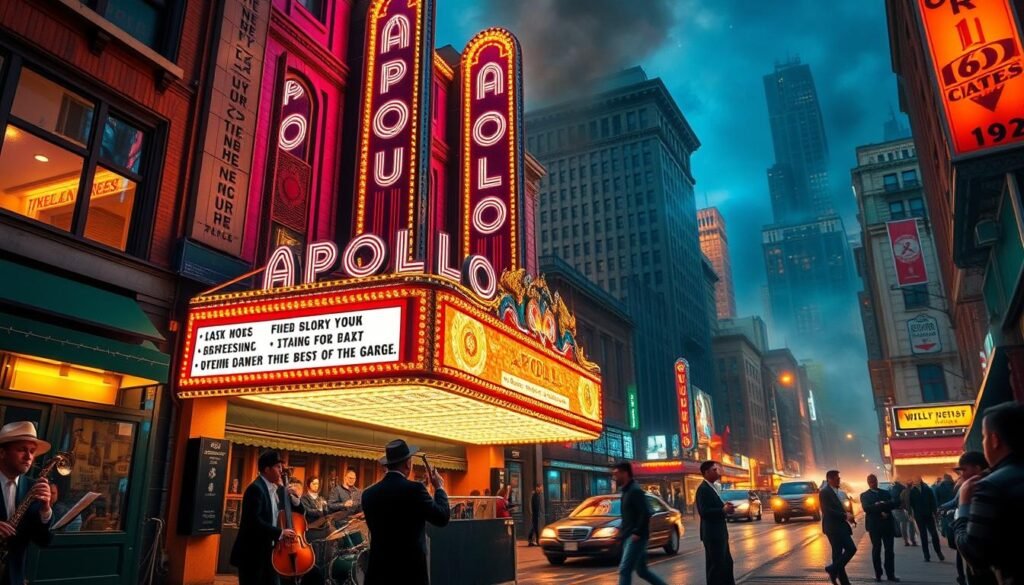
Looking for a small show in the Victoria Theater 1 or a big event on the main stage? The Apollo Theater has it all. Experience the music that has made this place legendary for so long. Join the story of Harlem’s artistic legacy.
Harlem, NYC jazz, live music, Apollo Theater, cultural experience
Harlem, the heart of New York City, beats with jazz, blues, and soul. The Apollo Theater is at its center, shaping America’s culture for decades. It’s where bebop was born and R&B evolved, hosting groundbreaking artists.
Exploring Harlem’s music heritage is transformative. The Apollo Theater connects you to African-American expression. Its Amateur Night and diverse shows nurture new talent, keeping Harlem’s legacy alive.
Harlem’s music scene is diverse, from jazz to hip-hop. Its clubs and the Apollo tell a story of resilience and creativity. This story is about the African-American community’s spirit.
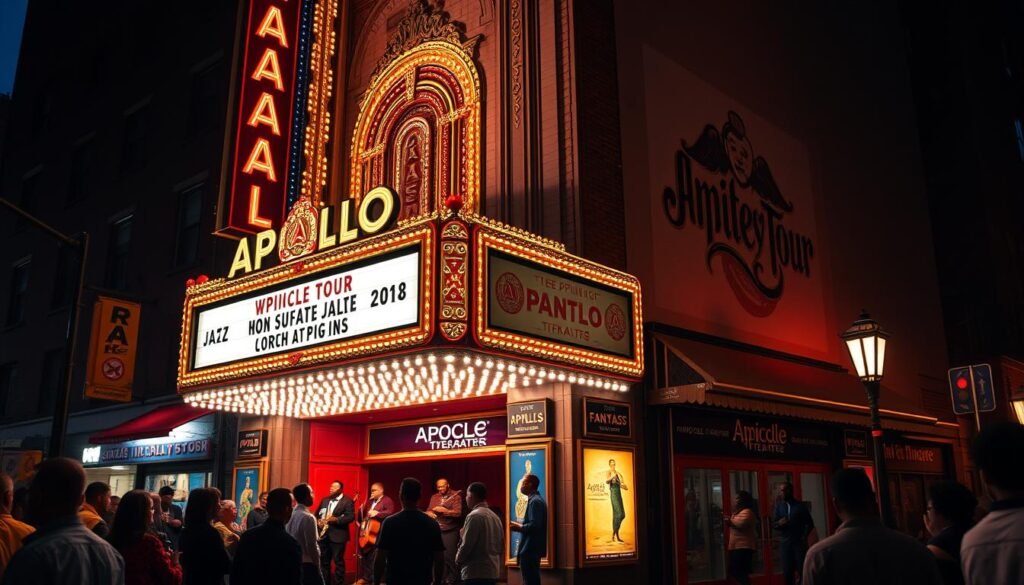
The Apollo Theater is getting its first big makeover in 90 years. It’s still dedicated to Black art and creativity. The theater inspires and uplifts through new programs, education, and community work.
Dive into Harlem’s jazz, live music, and culture. The Apollo Theater will take you on a journey through its rich history. This journey shows Harlem’s lasting impact on the world.
Explore the Vibrant Neighborhood of Harlem
Harlem is more than the Apollo Theater. It’s a place full of cultural experiences. Walk down Lenox Avenue, the heart of the Harlem Renaissance. Here, you’ll find arts, literature, and music from that time.
Lenox Avenue and the Harlem Renaissance
Lenox Avenue was the center of the Harlem Renaissance. It was a time of great African-American art, music, and writing in the 1920s and 1930s. See places like the Cotton Club and the Savoy Ballroom, where jazz and swing music filled the air.
The neighborhood’s history is alive at the Studio Museum of Harlem and the Schomburg Center for Research in Black Culture. These places show the art and culture of African descent.
Harlem’s food scene is also special. Try soul food at Sylvia’s Restaurant or the mix of flavors at Red Rooster. Don’t miss Settepani for Italian dishes or Abyssinia Restaurant for Ethiopian stews and injera.
Exploring Harlem, you’ll see its cultural history and music add to the Apollo Theater’s magic. It’s a place where culture and music come together beautifully.
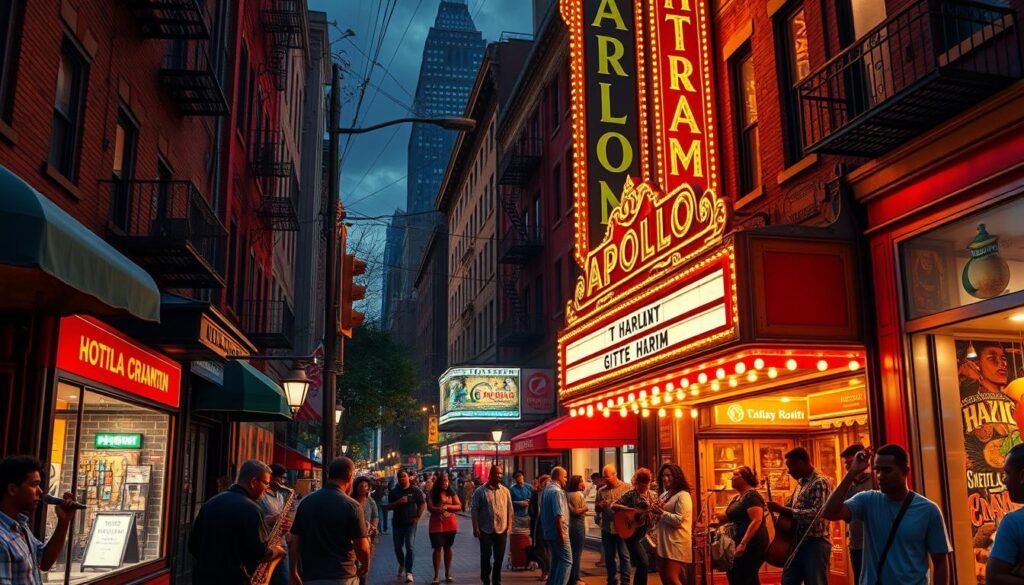
Behind the Scenes: Apollo Theater Tours
Step into the storied history of the Apollo Theater. This legendary venue has nurtured many musical icons. For a deeper connection, the Apollo offers behind-the-scenes tours. These tours give exclusive access to the “place where stars are born and legends are made.”
These tours, lasting 60-75 minutes, are led by Mr. Apollo, Billy Mitchell. They take you through the theater’s illustrious past. You’ll see the recording and television studios, learn about its landmark status, and appreciate its role in American music.
The tour schedule includes Mondays at 11 am and 1 pm, Wednesdays at 11 am, and Saturdays at 11 am and 1 pm. For groups of 20 to 55 people, the tour costs $15 on Mondays and Wednesdays, and $17 on Saturdays. Individuals and smaller groups pay $17 per person, no matter the day.
Immerse yourself in the Apollo Theater’s rich history and legacy. Discover backstage secrets and witness the inner workings of this iconic cultural institution. Become part of the enduring story that has captivated audiences for generations.
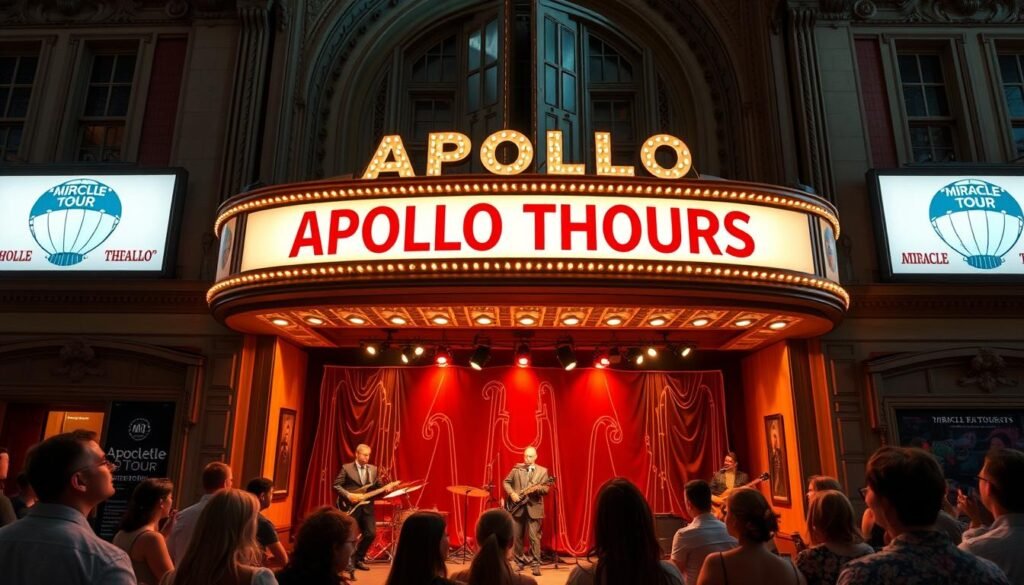
Historic Milestones and Iconic Moments
The Apollo Theater has seen many historic moments and iconic events. It started in 1914 as “Hurtig and Seamon’s New Burlesque Theater.” In 1934, it became the “125th Street Apollo Theater.” It has been a place where African-American talent shines, helping many artists on their way to fame.
Amateur Night and the Road to Stardom
The Apollo Theater’s history is marked by Amateur Night, starting in 1934. It has launched stars like Ella Fitzgerald, Sarah Vaughan, and James Brown. This weekly show lets new talent show their skills, aiming for stardom.
Many artists have found fame through Amateur Night. Marvin Gaye and the Jackson 5 are just a few examples. This tradition still excites audiences and inspires new performers at the Apollo Theater.
The Apollo Theater has seen many historic and iconic moments. It has hosted legendary acts like Billie Holiday and Aretha Franklin. These performances have shaped American music and culture.
The Apollo Theater keeps its legacy alive, even as times change. It remains a symbol of African-American excellence and a place where stars are born. Its rich history and ongoing commitment to talent ensure its lasting impact.
Planning Your Harlem Jazz Adventure
Starting your Harlem jazz journey is exciting. You’ll find many options to make your trip memorable. Harlem has cozy hotels and top-notch dining for all tastes and budgets.
Where to Stay
For a real Harlem feel, try a bed and breakfast or historic inn. These places offer comfort and a peek into local culture. Or, choose a modern hotel with amenities for travelers.
Where to Dine
Harlem’s food scene is amazing, with soul food, global dishes, and new creations. You can enjoy classic soul food or try upscale spots. There’s something for everyone.
Attractions and Exploration
Harlem has more than the Apollo Theater. Visit the Schomburg Center and Lenox Avenue for history and culture. Enjoy the arts and music that make Harlem special.
Your Harlem jazz trip will be unforgettable. It will be filled with sights, sounds, and tastes that make Harlem a global music and culture hub.
Preserving the Legacy for Future Generations
The Apollo Theater stands as a symbol of cultural heritage thanks to dedicated efforts. In 1981, Percy Sutton and his team bought the theater, starting its restoration. The Apollo Theater Foundation, Inc., founded in 1992, manages and funds the theater. It ensures the Apollo remains a hub for African-American culture and new talent.
The Apollo is committed to its past and future through education and community programs. It preserves its historic spaces, keeping its legacy alive. By supporting the Apollo, we help it inspire future generations.
The Apollo Stages at the revitalized Victoria Theater will have two theaters and a lobby. It will also have gallery space and offices. The new space includes two theaters: The Jonelle Procope Theater and Theater 1.
The Apollo will open with performances on February 9, 2024. The first show is The Renaissance Mixtape by Soul Science Lab. Tickets for the inaugural season will be under $20, thanks to The Jerome L. Greene Foundation.
An exhibition, From The Victoria to The Village: A Visual History of Black Creative Spaces, will run from February 1 to April 30, 2024. It features photographer Alex Harsley’s work and offers free tickets with RSVP. The Apollo supports new works by Black artists through The Apollo New Works initiative.
The Apollo Stages at The Victoria Theater project includes a historic building, residential units, and more. It aims to boost Harlem’s economy. The theater’s programming supports new artists and innovation.
By preserving the legacy of the Apollo Theater, we ensure it inspires future generations. It remains a beacon of cultural heritage and a platform for emerging artists.
Conclusion
The Harlem Jazz experience, centered around the iconic Apollo Theater, offers a unique chance to connect with Harlem’s rich musical history. From vaudeville and burlesque to a premier showcase for American music’s most influential artists, the Apollo has shaped Harlem and the nation.
Visiting the Apollo and exploring Harlem’s landmarks lets you join its legacy. You can celebrate Harlem’s musical spirit. Whether you love jazz or are new to it, Harlem Jazz will captivate you.
The Apollo Theater is getting a $70 million makeover. This renovation will keep its historical charm alive. It will also make it a hub for live arts, celebrating African-American culture and music.
Source Links
- Harlem Jazz Clubs, Festivals, Performances & Special Events – Harlem One Stop
- Where to Find the Best Jazz Clubs in Harlem
- Apollo Theater guide: Everything you need to know about the iconic Harlem venue | New York Theatre Guide
- Apollo Theater
- NYC Music Tour | Harlem Tourist Sites | Day Tours, Live Jazz, Live Gospel | Welcome to Harlem
- Harlem Gospel and Jazz Tours
- Calypso Uptown! | Apollo Theater
- About Us | Apollo Theater
- The Apollo’s Winter/Spring 2022 Season “The Renaissance is Now” | Apollo Theater
- 90 Years of the Soul of American Culture | Apollo Theater
- History
- Programs | Apollo Theater
- Harlem NYC Neighborhood Guide | Nest Seekers
- Discovering Night Clubs With Live Music in Harlem NY
- 10 Best Neighborhoods in NYC (Best Places to Live)
- Apollo Theater in Harlem | How to Take a Tour
- Experiencing the best jazz in Harlem, birthplace of bebop
- Apollo Theater | History, Performers, & Facts
- The Apollo Theater
- Private Harlem Tour in New York with Local Expert Guide
- New York City: Private Harlem Jazz Tour With Expert Guide
- The Apollo Celebrates its 90th Anniversary with the Opening of The Apollo Stages at the Revitalized Victoria Theater | Apollo Theater
- From Amateurs to Icons: Restoring Harlem’s Apollo Theater | National Trust for Historic Preservation
- Apollo Theater to undergo renovation under new leadership – The Ticker
- Press | Apollo Theater
